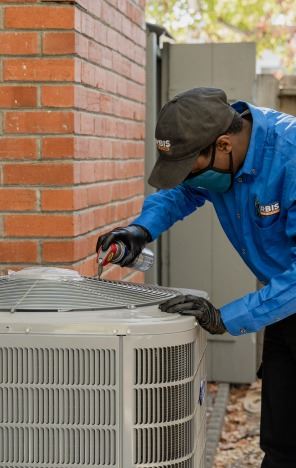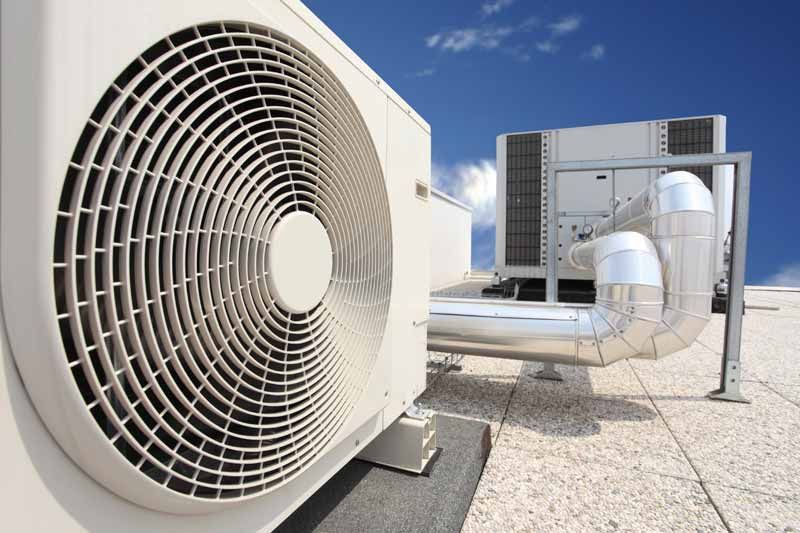Exploring the Services Used for Installing a Heatpump and Heater in Your Cooling And Heating Setup
When taking into consideration a new heating option, homeowners often face the decision between warm pumps and heating systems - heat pump service. Each system has distinct benefits and drawbacks. Expert setup plays a crucial function in making certain excellent efficiency and longevity of the devices. Comprehending the subtleties of the setup process can influence the performance of your HVAC configuration. What specific services can improve the installation experience and guarantee effectiveness? The solutions may surprise you
Comprehending Heat Pumps and Furnaces: Trick Distinctions
Heatpump and furnaces offer the vital feature of regulating indoor temperatures, yet they run on fundamentally different principles. Furnaces create warmth by melting fuel, such as gas or oil, or by utilizing electricity to cozy air. This warmed air is after that dispersed throughout the home via ductwork. In comparison, heatpump transfer warm from one location to an additional, commonly removing heat from the outdoors air or ground, also in cooler temperature levels. This makes them an energy-efficient option for both heating and cooling.While heating systems are commonly extra reliable in very chilly environments, heatpump can offer year-round temperature level control, adapting to seasonal modifications. The setup requirements also differ, as heaters require air flow systems for exhaust gases, whereas warmth pumps require room for outdoor systems. Recognizing these distinctions is important for home owners reviewing their heating and cooling down choices.
Benefits of Mounting a Heatpump
Choosing to mount a heatpump supplies several advantages that can improve home convenience and power performance. Heatpump give both heating and cooling down options, making them flexible for year-round climate control. Their capability to transfer warm as opposed to produce it results in reduced energy consumption, which can bring about significant cost savings on utility bills.Additionally, heat pumps run quietly compared to conventional furnace, adding to an extra calm home environment. They likewise call for much less upkeep, as they have less moving components and do not count on burning processes.Moreover, heatpump are eco-friendly, as they use renewable resource resources, reducing greenhouse gas discharges. Their setup may qualify property owners for energy effectiveness rebates or tax incentives, better improving the economic benefits. Overall, heatpump stand for an effective, eco-conscious choice for modern HVAC systems, ensuring convenience and sustainability.
Advantages of a High-Efficiency Heating system
A high-efficiency heater offers considerable energy cost savings, which can cause lowered energy bills for homeowners. Additionally, these systems add to a lower environmental impact by making use of much less fuel and releasing fewer emissions. Improved convenience levels are additionally a crucial benefit, as these heating systems maintain more consistent temperatures throughout the home.
Power Savings Prospective
While numerous home owners seek means to decrease energy bills, investing in a high-efficiency heater can substantially enhance power savings. These heaters make use of innovative modern technology to convert a higher portion of gas into usable warmth, considerably improving power performance. With a Yearly Fuel Utilization Effectiveness (AFUE) rating typically going beyond 90%, high-efficiency designs can conserve home owners substantial amounts on their home heating expenses contrasted to typical devices. Additionally, they run much more silently and require much less frequent repairs, which can even more contribute to total savings. Gradually, the first investment in a high-efficiency furnace typically repays via minimized power expenditures, making it an economically smart choice for those seeking to optimize their heating and cooling systems.
Ecological Effect Decrease
Spending in a high-efficiency heater not only advantages homeowners economically however likewise greatly minimizes environmental effect. These furnaces operate with increased energy efficiency, which translates to lower greenhouse gas emissions. By eating much less energy, they reduce reliance on nonrenewable fuel sources, contributing to a reduction in air contamination and assisting battle environment change. Additionally, high-efficiency models commonly utilize innovative modern technology that reduces waste, further improving their ecological benefits. The shift to such systems aligns with worldwide initiatives to promote sustainability, urging an action in the direction of renewable energy sources. Home owners play a vital role in promoting a healthier world while delighting in the benefits of minimized power prices and improved functional performance. Such options show a dedication to environmental stewardship and responsible resource administration.
Boosted Comfort Levels
High-efficiency heating systems significantly improve convenience degrees in property spaces by preserving extra consistent temperatures throughout the home. Unlike standard versions, these innovative systems utilize variable-speed blowers and modulating gas shutoffs, permitting for accurate temperature level modifications. This innovation decreases temperature variations, making sure that each area remains uniformly comfy. Additionally, high-efficiency heaters run quietly, adding to a serene interior environment. They also boost interior air quality by using innovative filtering systems that catch dirt and allergens, providing cleaner air for occupants. Moreover, their energy-efficient operation minimizes utility bills, making them an economical selection in the lengthy run. Overall, high-efficiency heaters not just promote a comfortable environment however likewise improve the general living experience within the home.
Specialist Installation Services: What to Anticipate
What can homeowners expect during the specialist setup of a heat pump and heating system? At first, a thorough analysis of the home's heating requirements will certainly be carried out by qualified specialists. This assessment guarantees the suitable sizing of the devices, contributing to energy efficiency and optimal performance.Once the assessment is complete, the technicians will schedule a setup date, preparing the site for the brand-new system. Property owners can prepare for a thorough installation process that consists of establishing the heatpump and furnace, attaching needed ductwork, and ensuring appropriate electrical connections.Technicians will certainly also inspect the cooling agent levels and check the system for leaks, ensuring everything operates effortlessly. House owners must anticipate clear communication throughout the procedure, with specialists explaining each action and addressing any concerns. After installment, a demonstration of the new system's procedure will be offered, making sure home owners recognize exactly how to utilize their brand-new heating remedy efficiently.
Routine Upkeep for Ideal Performance
After the professional setup of a heatpump and furnace, routine maintenance ends up being necessary for making sure peak performance. This upkeep typically includes regular inspections and servicing to identify possible problems before they rise. Technicians usually check the filters, ensuring they are clean and replaced as essential, as unclean filters can impede air flow and efficiency.Additionally, examining refrigerant degrees and guaranteeing electrical links are secure is important for operational security and performance. Routine upkeep may also involve cleansing the outside system of the heatpump to avoid debris build-up, which can impact performance.Moreover, scheduling yearly tune-ups helps to expand the life-span of the equipment and preserve power performance. House owners are motivated to keep documents of upkeep tasks, as this documents can aid in identifying patterns and guaranteeing timely actions. Regular upkeep not just boosts comfort however additionally maximizes energy consumption, resulting in cost financial savings gradually.
Repairing Common Heating And Cooling Issues
Several home owners experience common HVAC concerns that can interrupt convenience and efficiency. One common problem is poor home heating or air conditioning, commonly triggered by filthy filters, blocked air ducts, or Get More Information malfunctioning thermostats. An easy check of the air filter can deal with air flow troubles, while obstructed vents ought to be cleared for peak performance.Another constant worry is unusual noises, which may indicate loosened parts or mechanical wear. Homeowners need to listen for squeaks or rattles and examine quickly to avoid additional damages. In addition, frequent cycling can signal that the system is oversized or that a thermostat calibration is needed.Finally, refrigerant leaks in warm pumps can result in decreased efficiency and needs to be attended to by a professional. Repairing these typical concerns can help in preserving a comfortable interior environment while prolonging the life of the heating and cooling system. Looking for professional assistance when essential guarantees that these troubles are fixed properly and securely.
Price Considerations for Heatpump and Heating System Installation

Regularly Asked Concerns
How Long Does It Require To Set Up a Heatpump or Heater?
The installment duration for a warm pump or heater normally varies in between 4 to 8 hours, depending upon the complexity of the system, existing framework, and the experience of the setup group associated with the process.
Are There Funding Options Available for HVAC Installations?
Funding choices for HVAC installments vary by service provider, frequently consisting of adaptable layaway plan, financings, or credit choices. Property owners can explore these choices to take care of prices successfully, ensuring comfort upgrades straighten with their financial constraints.
What Permits Are Needed for Heatpump and Heating System Installation?
The necessary permits for heatpump and heater installation commonly consist of building, electric, and mechanical permits. Regional laws may determine details needs, so seeking advice from the over at this website local authority guarantees conformity and helps with a smoother installation process.
Can I Mount a Heat Pump or Furnace Myself?
The concern of self-installation for a warmth pump or heater emerges often. Typically, it is recommended to speak with professionals to ensure safety, compliance with regulations, and ideal efficiency, as improper setup can result in substantial issues.

What Service Warranties Are Normally Used on Installments?
Guarantees on setups usually vary by specialist and equipment. Normally, they might consist of restricted life time warranties on parts, one to five-year labor assurances, and specific protection for the system's effectiveness and performance, reflecting sector standards. In contrast, warm pumps move warmth from one place to another, commonly drawing out warmth from the outdoors air or ground, even in cooler temperatures. Their capacity to transfer warm rather than generate it results in reduced power intake, which can lead to significant savings on utility bills.Additionally, warmth pumps run quietly compared to traditional home heating systems, contributing to a much more peaceful home atmosphere. What can homeowners expect during the expert installation of a heat pump and heater? Property owners can expect a careful installment procedure that includes establishing up the warmth pump and furnace, connecting necessary ductwork, and ensuring correct electric connections.Technicians will certainly likewise inspect the cooling agent levels and evaluate the system for leaks, guaranteeing everything operates seamlessly. When thinking about resource Heating and cooling upgrades, particularly the installment of a warm pump or heater, recognizing the connected costs is essential for homeowners.